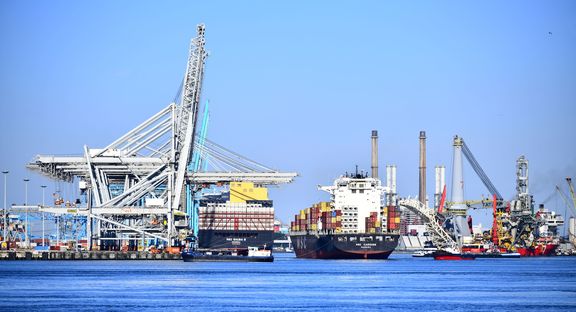Port of Rotterdam welcomes agreement on ETS for shipping
On Tuesday 18 April, the European Parliament formally adopted the political agreement to include shipping in the EU’s carbon emission trading scheme. From 2024 onwards, shipping, like industry, will be subject to the EU Emissions Trading System (EU ETS). The Port of Rotterdam welcomes this agreement, as it ensures the greening of shipping, but calls at the same time for more robust action against evasion.

“Putting a price on carbon emissions is a good stimulus to encourage the shipping sector to become more sustainable. Global shipping should have already been part of the Paris climate agreement. The EU is now rectifying this, at least for this part of the world. The extension of the ETS to the shipping sector will also support our own efforts to reduce emissions in this sector. At the same time, Europe has to watch out that ETS doesn’t lead to evasion. That wouldn’t help the climate nor the European ports”, states Allard Castelein, CEO of the Port of Rotterdam.
Global shipping is responsible for 3% of global CO2-emissions. Ships travelling between EU ports will soon have to hand over allowances for 100% of their emissions. A ship arriving from a port outside the EU must pay for 50% of its emissions. To avoid situations where ships from Brazil or Singapore will add a call to a port outside the EU before proceeding to an EU port, for example in North Africa, the co-legislators agreed that port calls on non-EU ports within 300 nautical miles from an EU port will be considered EU ports. This will only apply for non-EU ports that accommodate more than 65% in container transshipment activities. Whether this arrangement will sufficiently protect the competitiveness of individual ports remains to be seen. In case of doubt, the European Commission may take measures by expanding the number of extra-EU ports.
The Port of Rotterdam welcomes the measures to monitor and report on evasive behavior but calls for more robust action to take the risks of evasion fully into account. Research by CE Delft has found that evasive behavior is realistic, even when the ETS price is relatively low (compared to the extra costs of a port call, fuel costs, operational costs, etc.). Evasion threatens the integrity of the ETS, resulting in carbon and business leakage and undermining the competitive position of EU ports.
The Port therefore calls on the Commission to consider evasive behavior via all relevant non-EU ports, not only those ports where the total share of container transshipment exceeds 65%. If cargo diversion also takes place via ports below this threshold, this should be addressed adequately. Early action is crucial as changes in port traffic and the reconfiguration of shipping routes are hard to reverse once they occur.
Ships with a gross tonnage higher than 5000 GT will fall within the scope of ETS, starting as of 2024. These ships are responsible for approximately 90% of all CO2-emissions from the shipping industry. As of next year, these ships will have to surrender allowances for 40% of their emissions, going up to 70% by 2025 and 100% by 2026. Smaller ships will, for now, not be included in the ETS.
Approximately €1.5 billion of the revenue generated by the auctioning of ETS allowances will be allocated via the EU Innovation Fund to innovation and decarbonisation efforts in the maritime sector. The Port of Rotterdam has strongly advocated for this during the decision-making procedure.
The Port of Rotterdam has set up numerous projects, in cooperation with partners, to decarbonize the maritime supply chain. For example, together with the Ports of Singapore and Göteborg, ‘Green Corridors’ have been developed. On these corridors, shipping companies, fuel suppliers and shippers are committed to collectively decarbonize supply chains. Such initiatives will be supported by the introduction of ETS for shipping.